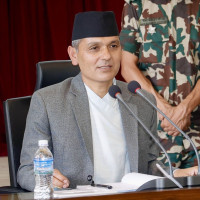- Friday, 20 February 2026
Hundi Takes A Toll On Economy
Nepal Rastra Bank (NRB) has recently published a notice warning the general public against resorting to the hundi system of money transfer while transferring money. The hundi system is an unofficial and unauthorised means of transferring money, such as remittances through channels other than banking channels or authorised remittance or money transfer companies. Under the hundi system, money is transferred by individuals or unauthorised networks. As per the notice, actual transactions need to be shown in money transfer and no payments are allowed without this, something that is bypassed under the hundi system. The notice urges the people to send money earned from foreign employment or other means through banking channels or authorised remittance or money transfer companies.
The hundi system emerged as a financial tool in India during the medieval period—the system aimed at enabling people to transfer money and settle debts. During the Mughal era, financiers established large hundi networks for the purpose of transferring money to Delhi. During the British Raj, the British rulers recognized the hundi system and considered it indigenous or traditional, but not informal, despite its operation outside the banking channels. It was regarded as an important component of the Indian economy. So the British rulers
sought to regulate and even tax the hundi system. Today, the hundi system is used mainly in Arab countries and South Asia.
Illegal financial activities
The data from the last seven years shows that the number of illegal financial activities is burgeoning in Nepal. Such illegal activities are driven by greed for earning money quickly. However, there are also instances of people losing money from a get-rich-quick mentality. The data show that over the last seven years, hundi transactions have grown remarkably. During the period, 203 people (147 Nepalis and 56 foreigners) were arrested and over Rs. 270 million was recovered. By the end of Chait of the current fiscal year, 51 people (45 Nepalis and six foreigners) had been arrested with a recovery of over Rs. 59 million.
Nepal is a remittance-receiving country. Many families, especially in rural areas, depend on remittance money for household, social and other purposes. The country's economy is partly buttressed by remittance money. It contributes around a quarter of the gross domestic product. There are hundreds of thousands of Nepalis working abroad, particularly in India and the Gulf countries. They send back remittances amounting to billions of rupees to their homeland every year. During the first ten months of the current fiscal year, Nepal received remittance money worth Rs. 1,356.61 billion. The figures are based on the money sent through banking channels and authorised remittance or money transfer companies. However, the remittances sent through the hundi system remain unaccounted for.
The hundi system has become a headache for both the NRB and banks and financial institutions (BFIs). It takes a toll on the foreign exchange reserves of the NRB. As physical money does not get transferred to Nepal, the forex reserves of the NRB get affected. Had all the money been remitted back home through authorised channels, the forex reserves would have risen greatly. The presence of adequate foreign exchange reserves is a sign of a robust economy. It facilitates imports and foreign travel of people, among others.
The hundi system is perceived as a fast and convenient channel of money transfer. But it lacks regulation, which may give rise to financial scams, resulting in financial losses for senders and recipients. If such an untoward event happens, there will be no legal recourse because the hundi system itself is illegal and has no tracking mechanism. Nor is there any proper documentation. On the other hand, banking channels and authorised remittance or money transfer companies have a tracking mechanism. If something goes amiss when money is sent, the tracking mechanism can be activated and the error, if any, can be rectified. So, such authorised channels of money transfer are reliable. Further, owing to anonymity embedded in the hundi system, it can be used for illegal activities such as money laundering or financing of terrorism.
As Nepal is on the Financial Action Task Force (FATF) grey list, curbing the hundi system could mitigate the risks arising from illegal activities to some extent. As stated above, Nepal receives billions of rupees from remittances. As there are no records of remittances received through the hundi system, the actual amount of remittances cannot be determined. Hundi operators or agents are not registered with the NRB or other relevant financial regulatory bodies. They give higher rates of exchange than banks or authorised remittance or money transfer companies do. This is one of the reasons people are attracted to the hundi system.
Pitfalls
As the hundi system is full of pitfalls, it would be prudent on the part of the general public and migrant workers to use reliable channels of money transfer, such as banks or money transfer companies. Dedicated remittance services such as WorldRemit, Western Union or IME Pay are considered reliable remittance channels. Some digital wallets and mobile money transfer platforms can also be resorted to for safe money transfer. When there are safe and reliable channels of money transfer, people need not use the illegal system to send money back home.
The aforementioned notice is a wake-up call for the general public and migrant workers to be on the lookout for possible risks from the hundi system. People should use banking channels or authorised remittance or money transfer companies to remit money back home. It may be noted that operating the hundi system is liable to punishment under the Criminal Code, 2018. There is a provision of one year’s imprisonment and seizure of the money, assets or earnings gained from illegal transactions.
(Maharjan has been regularly writing on contemporary issues for this daily since 2000.)














